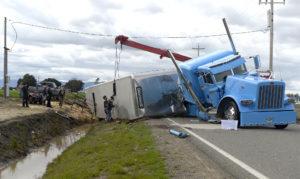
Statistics from the U.S. Department of Transportation show there were roughly 273,000 accidents in 2011 involving large trucks. Of those crashes, 3,341 involved fatalities and about 60,000 involved injury. These rates show an increase in truck accidents from the previous year.
The Federal Motor Carrier Safety Administration (FMCSA) has introduced the 2012-2016 Strategic Plan in efforts to improve highway safety for both the general public and those in the commercial motor vehicle industry.
The Purpose of the FMCSA Strategic Plan
The FMCSA’s stated mission is to reduce and/or eliminate bus and truck accidents, injuries and fatalities.
The administration proposes doing so with a combination of:
- education/public awareness efforts;
- innovative solutions to safety concerns;
- updating and adding regulations where needed;
- improved enforcement of existing regulations;
- providing financial assistance by way of grants to state and local agencies;
- establishing partnerships to foster the overall mission; and
- demanding more accountability throughout the industry.
The FMCSA is striving for a “holistic approach” to eliminating problems within the industry and infrastructure that contribute to annual truck accident deaths.
For a free legal consultation, call (614) 538-1116
How the Strategic Plan Addresses Trucking Industry Safety
The FMCSA Strategic Plan aims to address safety concerns by reinforcing three of the administration’s core principles/goals:
- raising the bar for entry into the commercial motor vehicle industry;
- requiring operators to maintain skills; and
- removing service providers, drivers and carriers that cannot adhere to safety requirements.
The FMCSA aims to develop new programs, regulations and initiatives in support of these principles.
Some of the activities and programs in development include:
- developing new standards;
- updating compliance policies;
- updates to existing drug and alcohol testing programs;
- reviewing and improving current commercial driver’s license programs;
- providing grants in support of compliance, safety and accountability;
- providing grants in support of technology and data/information gathering;
- improving onboard safety systems;
- updating driver testing and evaluations; and
- consumer education.
The FMCSA has identified such programs as among those that will contribute to an overall reduction in commercial motor vehicle accidents over the next few years.
How do we get safer roads? A Look at FMCSA Strategies
The FMCSA has outlined proposed strategies and potential outcomes that operate in support of its three core principles and goals. Some of the strategies are as follows:
- implement new standards for driver/operator credentialing (with the intended outcome of keeping unqualified drivers off the roads);
- reduce fraud within the commercial drivers license process;
- update standards for driver safety fitness;
- identify legislative shortcomings and closing regulatory gaps;
- expand educational outreach beyond the commercial industry;
- better enforcement of sanctions for companies that fail to address driver safety issues; and
- better oversight of carriers (to prevent unsafe companies from “rebranding” as a new entity while operating under the same inadequate system).
This is just a small sampling of how the FMCSA intends to address trucking industry safety concerns. A truck driver or carrier who fails to adhere to new or long-established federal regulations may be liable in the event of an accident. To learn more, schedule a free case consultation with Bressman Law – (614) 538-1116.
Call or text (614) 538-1116 or complete a Free Case Evaluation form








